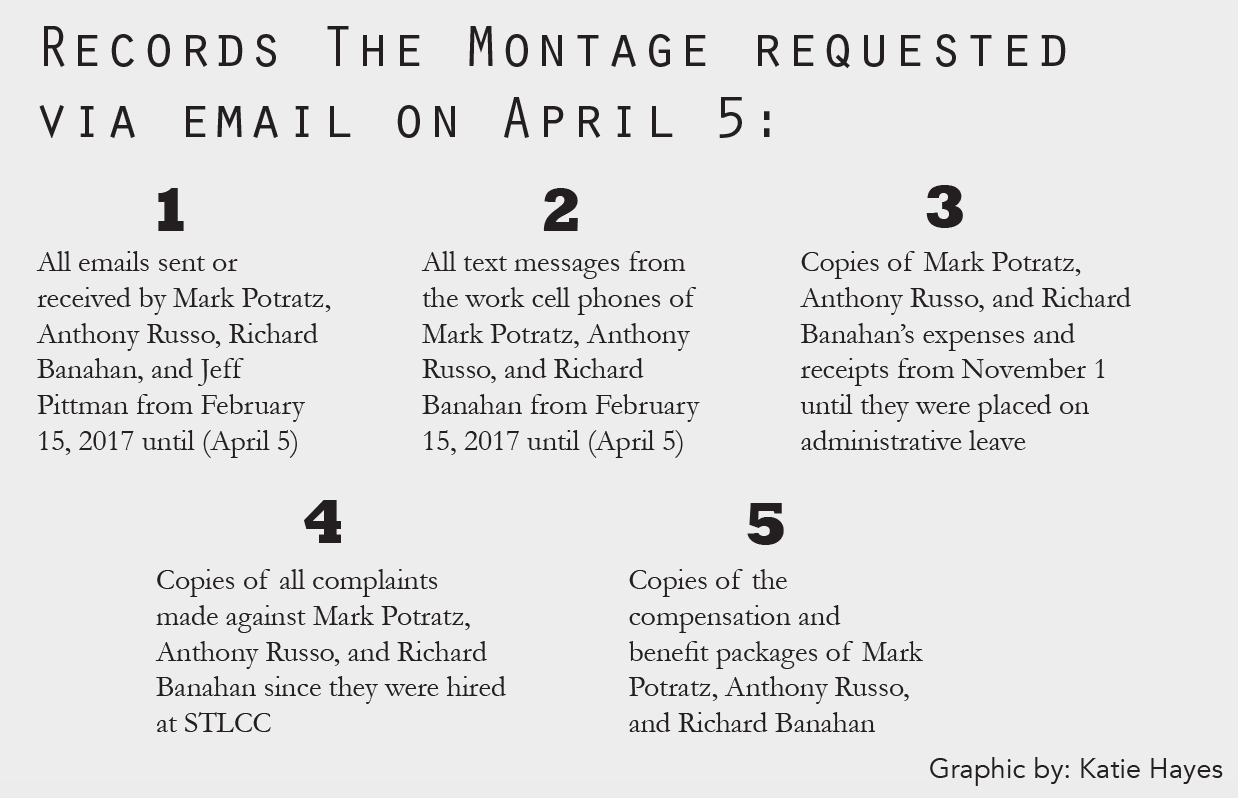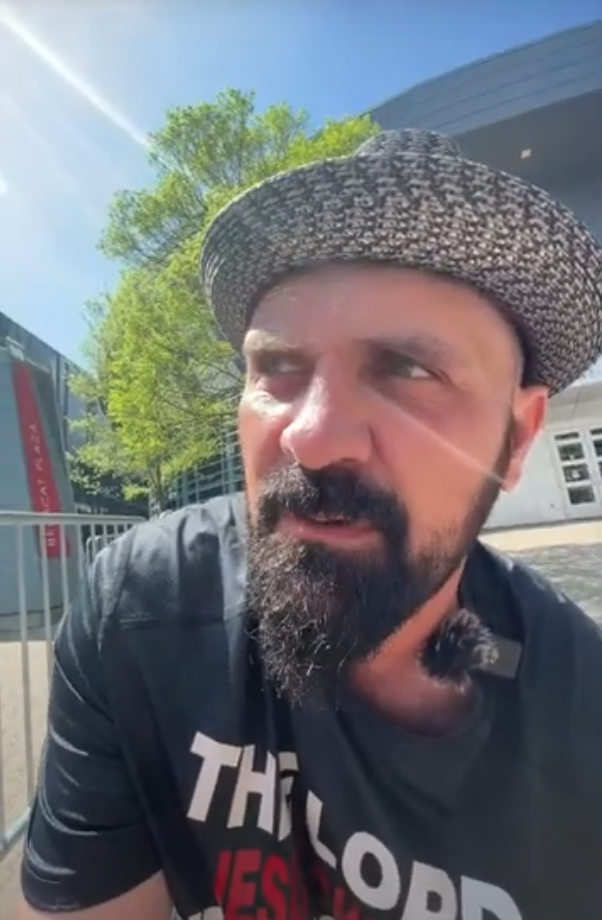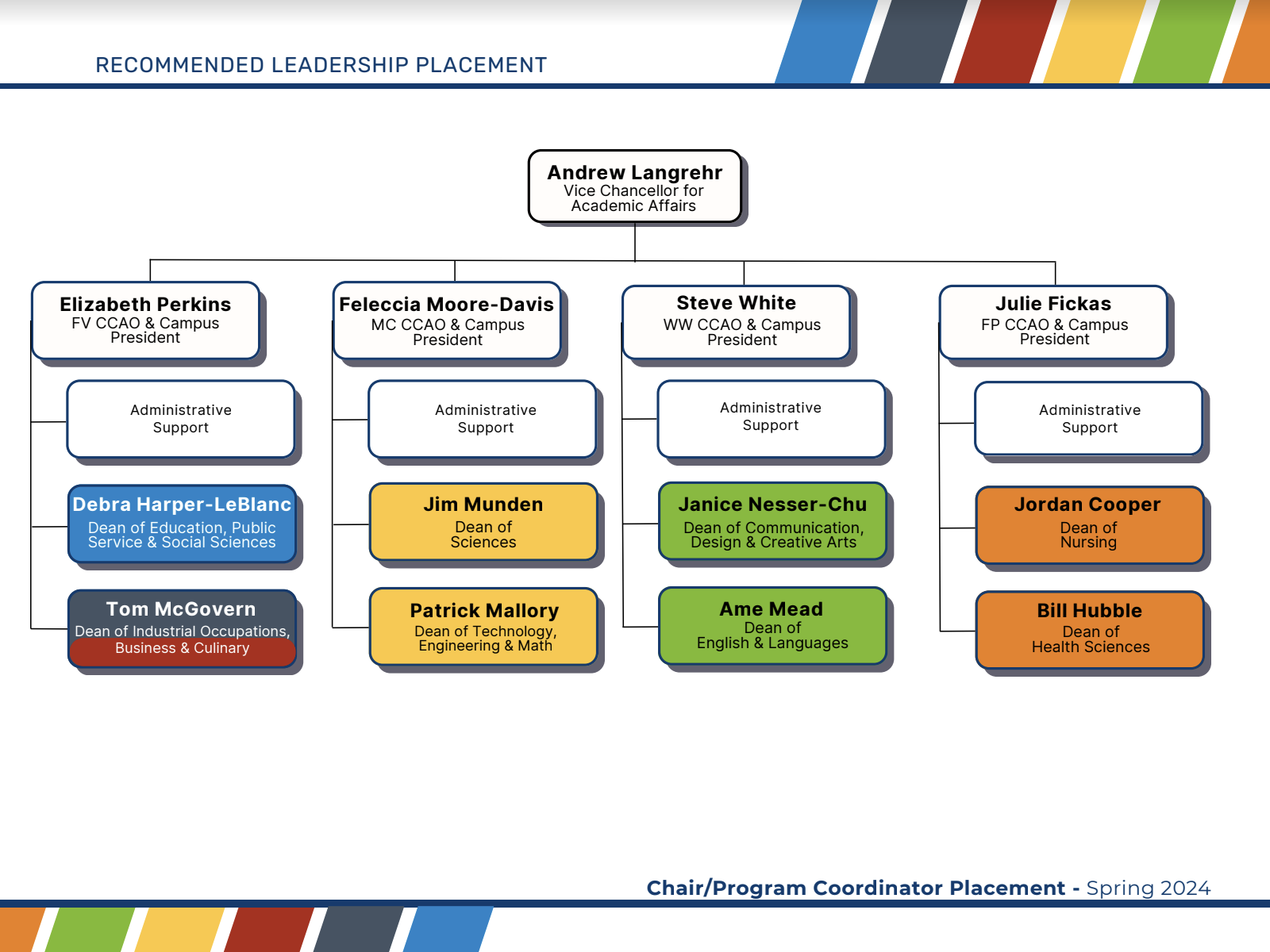Reasons for three former police chiefs’ departure remains unknown
 By: Katie Hayes
By: Katie Hayes
Editor-in-Chief
St. Louis Community College disobeyed the Missouri Sunshine Law, sometimes known as the Missouri Open Records Act, by failing to cite why requested public records should be closed by the three-day deadline offered by Missouri law.
Chancellor Jeff Pittman announced to all STLCC employees by email that Director of Public Safety and Emergency Management Mark Potratz, Meramec and Wildwood Campus Police Chief Anthony Russo and Forest Park and Florissant Valley Campus Police Chief Richard Banahan would all “pursue other professional opportunities” effective immediately on Thursday, March 30.
The St. Louis Post-Dispatch reported that the three officials were placed on paid administrative leave. Human Resources said Potratz, Russo and Banahan are on administrative leave and that the personnel files of the three officials are sealed. This also means that termination or resignation letters — which would cite a reason that each left — do not exist.
The Montage submitted a records request by email on April 5 for copies of a number of documents including the compensation and benefit packages of Potratz, Russo and Banahan as well as their expenses and receipts. However, Human Resources denied the request by email less than two hours later.
“Please accept this email as notification that this office will not be providing the information that you have requested below,” read the email from Human Resources.
The Montage replied 24 hours later asking for citations of why each document was exempt, in accordance with the Sunshine Law. The Sunshine Law allows a public body three business days to either produce copies of the requested records, determine if the record should be closed and cite why it should be closed or inform the requester that more time is needed to find the records.
“There are three proper responses any time a request is made under the Sunshine Law,” said Jean Maneke, a lawyer who represents the Missouri Press Association. “For them [STLCC] to not have even responded is breaking the Sunshine Law.”
Maneke said the presumption is that public records are open, but it is the public body’s responsibility to respond if they are closed.
“If [the public body] has been sued, it has to rely as a defense on whatever reason it gave,” Maneke said. “It can’t give reason number one [to the requester] and then tell the court it’s reason number two. It has to decide what the reason is to keep the record closed. So by not responding to a request with a reason is in essence citing that it doesn’t have a reason to keep a record closed.”
Pittman did not respond to request for comment as to why STLCC would not produce the records or cite specific laws which allowed STLCC to withhold them.
“I don’t know [why STLCC was refusing to release the records], but that’s not the public’s job,” Maneke said. “It is the job of the public body who receives the request — specifically when it is asked to advise the requester of what that reason is.”
Student Press Law Center Executive Director Frank LoMonte said this case is a bit more blatant than cases he usually deals with.
“Typically the student receives written justification,” LoMonte said. “It’s very unusual to just blow off the request completely. This shows either a misunderstanding or defiance of the law. I think they [STL CC] recognize [The Montage] does have some legal entitlement to at least part of that request.”
Russo and Banahan did not respond to request for comment. Potratz could not be reached. At press time, on April 18, 13 days after the original request, The Montage did receive an email from General Counsel and Chief Legal Officer Mary Nelson. Nelson requested all future open record requests be forwarded to STLCC’s custodian of records, Rebecca Garrison.
In response to The Montage’s request for emails sent or received by Potratz, Russo, Banahan and Pittman between February 15, 2017 and April 5, Nelson wrote, “Please clarify whether you are seeking emails between the named individuals, or all emails generated by each of them during the specified time period.”
The Montage also requested text messages from the work cell phones of Potratz, Russo and Banahan between February 15, 2017 and April 5. Nelson wrote that “the College does not issue ‘work cell phones’ to employees, nor does it require its employees to utilize personal cell phones for work purposes.” Public officials’ text messages are only public record if they are on phones issued by a public body.
In response to the request for all complaints against Potratz, Russo and Banahan, Nelson asked for clarification. Nelson wrote, “records of allegations of civil rights violations (e.g., Title VII, ADA, etc.) or other alleged statutory violations for which the College has a duty to investigate and take appropriate remedial or disciplinary action” are subject to Missouri’s Sunshine Law.
Nelson said STL CC will conduct a search for public records of complaints against the three officials. STLCC did not provide receipts and expenses for Potratz, Russo and Banahan from Nov. 1 until they were placed on paid administrative leave, but said they will produce them in one business day.
Nelson also said the request for the compensation and benefit packages for the three officials needed clarification. Nelson wrote, “your request for ‘copies of the compensation and benefit packages’ of these employees is unclear. While the College does not provide ‘compensation and benefit packages,’ it maintains records of wages paid, and benefits provided (e.g., group insurance programs).”
The Montage’s request regarding the compensation and benefit packages was listed in bullet point form as one of the requested items and said, “Copies of the compensation and benefit packages of Mark Potratz, Anthony Russo, and Richard Banahan.”
The Montage will continue to pursue these records to keep the campus community informed.
Retired Lt. Col. Alfred Adkins will serve as interim director of public safety and emergency management. Adkins is a 35-year veteran of the St. Louis Metropolitan Police Department.
When announcing the departure of the three, Pittman’s email to the faculty and staff on March 31 said, “Our campuses are safe and secure, thanks to the efforts of our College Police. However, we need to re-focus those efforts to adopt best practices, increase safety awareness and finally, align our policing function with other departments to demonstrate a district culture of care for our students, employees, and visitors.”











